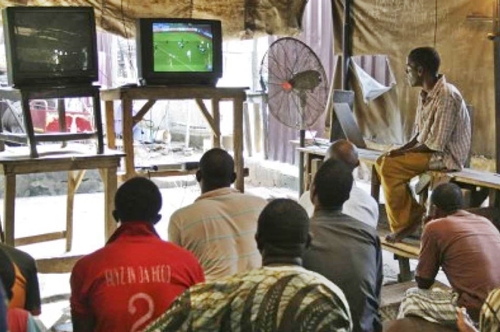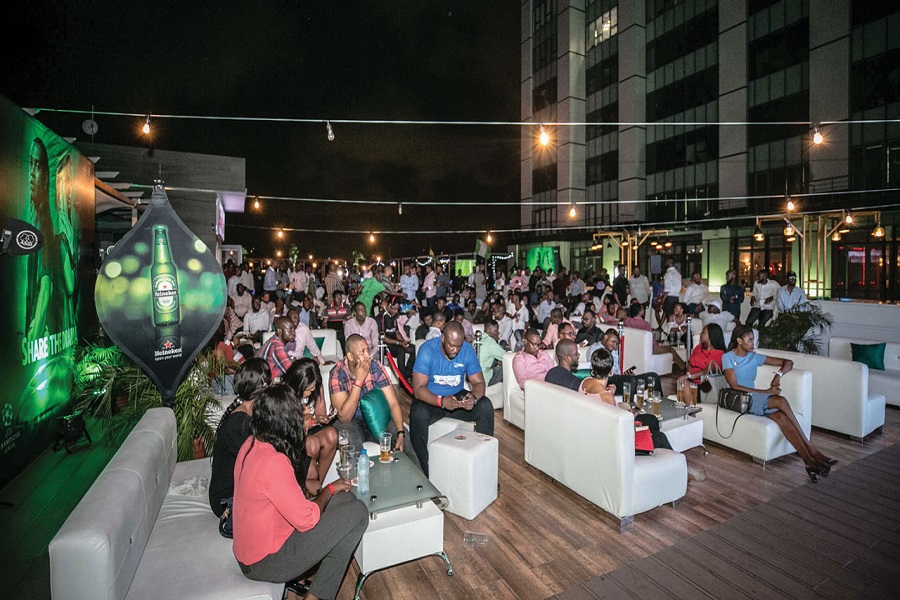There is no love lost between operators of football viewing centres and bar owners. The animosity between them has silently been on the rise over the years, but today, Nairametrics gives voice to the rivalry that has long gone unnoticed among football lovers in Nigeria.
The friction between viewing centres and bars is not uncommon in the business world, especially when a business begins to encroach on the territory of another that operates in the same market.
There have been occasions where bank executives shook hands at social events, only for their banks to squabble over a customer’s business. Grudges like this are often not personal — it’s strictly business. Nairametrics learnt more about this rivalry from discussions with some bar owners and operators of viewing centres.

[READ MORE: Top 5 businesses that may be affected by Super Eagles’ loss]
The viewing centre used to be the home of football lovers across Nigeria. Its concept originated from the time individuals of a community gathered in a compound to watch the Super Eagles on terrestrial television, NTA. With the advent of pay-TV and as the enthusiasm for European football clubs spread in Nigeria, the idea was transformed into a business venture. Today, there’s hardly a street without a viewing centre situated there.
The spread of viewing centres across Nigeria can be likened to that of the Church— so many options to choose from. In the early to late 2000s, the charge was N50 per head and customers were many. But now, while the price has increased to N100, the number of customers has steadily declined.
What happened? Initially, there was a clear demarcation on the functions of viewing centres and bars respectively. The former was for watching football, while the latter was set up as a relaxation spot for drinks, conversations, or self-reflection with music blaring through speakers; but over the years, lines have been crossed — managers of the bars have infused football matches to lure customers and increase revenue.
While customers don’t pay to watch matches at bars, they need to spend to be able to watch a football game. And in most cases, they spend more on match days than they spend at viewing centres. A customer is expected to buy at least a bottle of drink which is often about N300. This is N200 more than is required at the viewing centres.
Despite the price disparity, the customer base and revenue of viewing centres are taking a hit.
“There are things that affect the viewing centre like bars. Bars are everywhere now,” Joseph Akinbola, a viewing centre operator around College Road, said.
To underpin Akinbola’s statement, Baba Lola, another viewing centre operator, told Nairametrics that, “We are losing customers to bars almost every time now. It’s worse than it used to be. I don’t know why some people prefer to spend more at bars when they can just spend less here.” He opined that the threat posed by bars to the growth of viewing centres should be curbed through levies and regulations such as those which viewing centres are subjected to.

Why people are leaving FVC
Obviously, it’s not because of the competitive price. While speaking to some bar owners, Nairametrics learnt that bars are offering football lovers what viewing centres lack — mature scenery.
[READ ALSO: 10 fastest growing business opportunities in Nigeria]
According to Segun Olorunpomi, a bar owner in Ogba, people are getting tired of the rascality often experienced at viewing centres.
“When you go to watch ball at viewing centres, you see how some people misbehave – the shouting and the insults. One small boy can talk to you anyhow and disrespect you.
“So, people are getting tired of rude behaviour. Here (bar), people are undisturbed. Nobody will disrespect you and the screaming is limited because this is a mature environment where people come to relax. Also, if anyone is being disrespectful, I can tell the person to leave after he’s done drinking because they didn’t pay to watch ball, but to drink.”
Another bar owner, Precious Yesha seconded Olorunpomi’s statement. She said, “Viewing centres are losing customers maybe because of the way they are operated. At my place, people just come to drink and the football match is extra service.”
Meanwhile, another individual, who chose to remain anonymous, told Nairametrics that he stopped operating viewing centres because of the dwindling numbers of customers. He said there’s now a shortage of people who go to watch football at viewing centres, and yet the subscription fee continues to rise.
And according to Akinbola, operators of viewing centres are merely indirectly working for DSTV because they (operators) no longer make much from the venture. To give an example of how bad the business has been, Akinbola said that he used to operate in a place that had more capacity than his present location.
How FVC loss is helping bars
During match days, there’s always a growth in bars’ revenue, compared to non-match days. Olorunpomi and Yesha said they sell more during matches because that’s when their customer patronage increases.
MultiChoice will be affected
If bars continue to grow customer base to the detriment of viewing centres, operators of the viewing centres won’t be the only ones to lose out. MultiChoice could also be affected, as viewing centres are another source of revenue for the pay-TV. They pay a percentage to DSTV for the matches they show, unlike bars that don’t monetize matches shown by DSTV.
So, if viewing centres keep shutting down due to loss of customers, the payment DSTV receives from viewing centres will continue to drop.

Viewing centres are fighting back
Nairametrics learnt that some viewing centres are now adding edibles and drinks to their service; however, it doesn’t come for free. According to Akinbola, this is their way of appealing to the urban lifestyles of the clientele (in his community) that demand the total package of a relaxation centre.
[READ FURTHER: 15 Lucrative businesses one can own as a side hustle]
Despite this innovation, to survive, these viewing centres depend largely on derby matches played on different dates and times. That’s how someone like Akinbola earns returns on investment.
What infuriates the operators of viewing centres is that after the football season ends across Europe, bars continue to operate, earning revenue, while viewing centres shutdown throughout the break because that’s the business’ sole purpose— to show football.

















